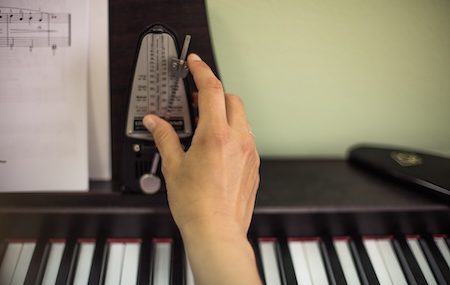One, two, three, four. How do you get even better at playing the piano?
Practice. But practice is more than just sitting down and playing. You have to work at perfecting your practice. Feel the beat. Feel the rhythm. And have more fun creating your music.
One tool that can greatly enhance your skills is the metronome. Whether you’re a beginner or an experienced pianist looking to improve, incorporating the metronome into your practice routine can yield immediate results.
Step 1: Set Your Tempo
Start by selecting a tempo that matches the piece of music you’re practicing or a comfortable pace for your exercises. The metronome allows you to adjust the tempo to your liking, so experiment until you find a speed that challenges you without feeling overwhelming.
Step 2: Focus on Timing
Once you’ve set the tempo, focus on perfectly synchronizing each note or chord with the metronome’s clicks or beats. Pay close attention to maintaining a consistent rhythm throughout your practice session, as this will train your sense of timing and help you develop a steady tempo.
Step 3: Start Slowly
If you’re new to using a metronome, start at a slower tempo and gradually increase the speed as you become more comfortable and confident in your playing. This gradual progression allows you to build muscle memory and accuracy without sacrificing precision.
Step 4: Practice Regularly
Consistency is key to improving your piano skills. Incorporate metronome practice into your daily routine, even if it’s just for a few minutes each day. Over time, you’ll notice significant improvements in your timing, coordination, and overall musicality.
Step 5: Experiment with Different Rhythms
Challenge yourself by experimenting with different rhythms and time signatures. This will not only expand your musical repertoire but also sharpen your ability to adapt to various rhythmic patterns, making you a more versatile and expressive pianist.
Step 6: Listen Critically
As you practice with the metronome, listen critically to your playing and adjust accordingly. Pay attention to any discrepancies between your timing and the metronome’s beats, and strive to correct them with each repetition. The goal is to achieve precision and accuracy in every note you play.
Step 7: Stay Patient and Persistent
Improving your piano skills takes time and patience, so don’t get discouraged if progress initially feels slow. Stay persistent in your practice efforts and celebrate small victories along the way. You’ll gradually notice a significant improvement in your playing with dedication and consistent practice.
We understand that playing the piano is a lifelong commitment. However, playing should be as much about enjoyment as it is about learning.
Whether you’re practicing scales, exercises, or full-length pieces, the metronome is a valuable tool for refining your skills and becoming a more confident and proficient pianist.
Whether you need accessories to make your practice sessions better, or a new piano to make the experience more enjoyable, we’re here to help you every step of the way.
How can we help you?


